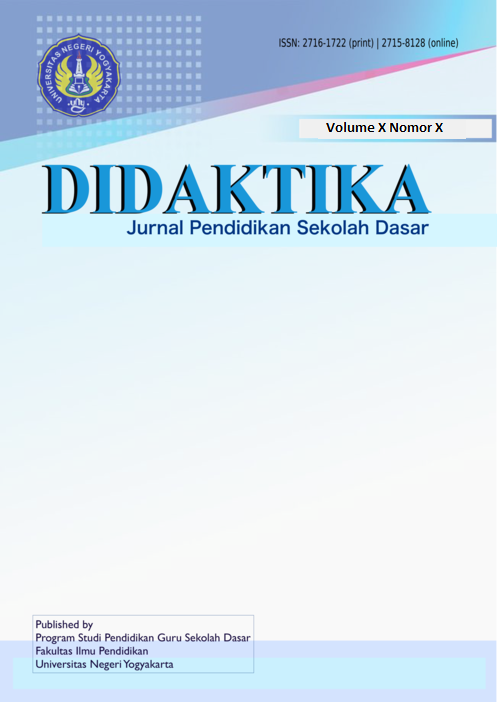Implementation of Class Management through Google Classroom during Online Learning in Elementary School
DOI:
https://doi.org/10.21831/didaktika.v4i2.41032Abstract
References
Andriani, Tuti. (2015). Sistem Pembelajaran Berbasis Teknologi Informasi dan Komunikasi. Jurnal Solusi Budaya: Media Komunikasi Ilmu, Ilmu Sosial dan Budaya, 12(1), 128- 150. Diakses melalui laman http://ejournal.uin-suska.ac.id/index.php/SosialBudaya/article/view/1930/1344
Choudhury, H. & Khataniar, G. (2016) Features Based Comparison and Evaluation of Elearning Platform in Academic Environment. International Journal of Digital Application & Contemporary Research, 4 (06). Diakses melalui laman http://ijdacr.com/uploads/papers/40600-16-100.pdf
Efendi, R., & Gustriani, D. (2020). Manajemen Kelas di Sekolah Dasar. Pasuruan: Qiara Media.
Emmer, E. T., & Stough, L. M. (2001). Classroom Management: A Critical Part of Educational Psychology, With Implications for Teacher Education. Educational Psychologist, 36(2), 103–112. Diakses melalui laman https://doi.org/10.1207/S15326985EP3602_5
Gunawan, Sunarman. (2018). Pengembangan Kelas Virtual Dengan Google Classroom dalam Keterampilan Pemecahan Masalah (Problem Solving) Topik Vektor pada Siswa SMK untuk Mendukung Pembelajaran. Prosiding Seminar Nasional Etnomatnesia, 340-348. Diakses melalui laman http://jurnal.ustjogja.ac.id/index.php/etnoma tnesia/article/view/2334/1296
Hasanudin, dkk. (2018). Optimalisasi Pemanfaatan Google Classroom sebagai Media Pembelajaran di SMK Negeri 1 Bakinang. Jurnal Pendidikan Untuk Mu Negeri, 2(1), 17-20. Diakses melalui laman http://ejurnal.umri.ac.id/index.php/Pengabdia nUMRI/article/view/361/352
Iftakhar. (2016). Google Classroom: What Works and How?. Jurnal of Education and Social Sciences, 3(1), 12-18. Diakses melalui laman https://www.jesoc.com/wp-content/uploads/2016/03/KC3_35.pdf
Sanjaya, Wina. 2015. Penelitian Pendidikan, Jenis, Metode dan Prosedur (Cetakan ke-3). Jakarta: Kencana Prenada Media Group.
Satgas Covid-19 Indonesia (2021). Data Kasus Covid-19 Terkonfirmasi di Indonesia tanggal 4 Mei 2021. Data diakses melalui laman resmi Satgas Covid-19 Indonesia https://covid19.go.id/ pada tanggal 4 Mei 2021 Pukul 20.22 WIB.
Sugiyono. 2011. Metode Penelitian Kuantitatif, Kualitatif dan R&D. Bandung: Afabeta.
Surat Edaran Mendikbud Nomor 4 Tahun 2020 tentang Pelaksanaan Kebijakan Pendidikan dalam Masa Darurat Penyebaran COVID-19 Poin 2. Diakses melalui laman https://www.kemdikbud.go.id/main/blog/2020/03/se-mendikbud-pelaksanaan-kebijakan-pendidikan-dalam-masa-darurat-penyebaran-covid19
Sutisna, D. & Indraswati, D. (2020). Kecakapan Manajemen Kelas Guru sebagai Upaya Penyelesaian Problematika Pembelajaran Dimasa Pandemi Covid 19. Jurnal Ilmiah Pendidikan Dasar, V (02), 204-220. Diakses melalui https://journal.unpas.ac.id/index.php/pendas/article/download/3491/1580
Downloads
Published
How to Cite
Issue
Section
Citation Check
License
- Authors retain copyright and grant the journal right of first publication with the work simultaneously licensed under a Creative Commons Attribution License that allows others to share the work with an acknowledgement of the work's authorship and initial publication in this journal.
- Authors are able to enter into separate, additional contractual arrangements for the non-exclusive distribution of the journal's published version of the work (e.g., post it to an institutional repository or publish it in a book), with an acknowledgement of its initial publication in this journal.
- Authors are permitted and encouraged to post their work online (e.g., in institutional repositories or on their website) prior to and during the submission process, as it can lead to productive exchanges, as well as earlier and greater citation of published work.






